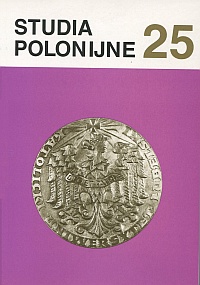From the History of Polish Education in Belgium in the Period 1918-1939
Main Article Content
Abstract
Emigrating to Belgium to look for a job and good earnings was started in 1911 by the Polish Emigrant Association in Cracow. Initially care was taken of the Polish immigrants and their culture by a group of students from the Lelewel Association in Brussels. In 1923 this task was taken over by the Committee for Cultural-Social Protection for Polish Immigrants. Its work, aiming at ensuring the teaching of the Polish language, supported by local associations and committees as well as by government institutions in Poland, resulted in concluding an agreement with the Belgian government. The Ministry of Education in Brussels, according to the Belgian legislation, acknowledged that Polish schools, where lessons were conducted in Polish, had been established and that they were maintained by the Committee for Cultural-Social Protection. This guaranteed a complete independence for Polish schools as far as their organization, language of instruction, curriculum and subjects were concerned.
The Polish community tried to bring a Polish teacher to Belgium from 1924. At first the classes were conducted in a Belgian school when there were no lessons for Belgian pupils. The curriculum was based on the curriculum of Polish schools; however, it took into consideration the situation of Polish schools abroad. In its work the Committee did not forget about the youngest generation of Poles and established kindergartens for them.
Although the agreement was binding for the whole of Belgium and it concerned all the Polish centers, the way education was organized was not uniform. Poles constituted a fairly comprehensive circle only in Limburg, whereas in the districts of Mons, Charleroi and Liège they were dispersed.
It was also not everywhere that Polish schools met with a favorable attitude of the local community. The Belgian authorities were consistent in putting into effect their program of denationalizing minorities. Starting from the school year 1932/1933 schools with Polish as the language of instruction were systematically replaced by Polish courses. These actions were supported by the attitude of the local clergy who often limited the possibilities of reciting the liturgy in Polish.
In 1934 Polish schools in Belgium were closed down. Because of the growing conflict between the Walloons and the Flemings the Flemish authorities liquidated the French schools for Walloons. As they did not want to directly make such a decision, they liquidated all non-Flemish schools. Hence all the minorities' schools shared the fate of the Polish schools. As result of the `re-organization' only Polish courses were left.
This was one of the reasons why Polish authorities wanted the Polish Catholic Mission to increase the impact of the Polish clergy on the Polish emigrants, as – the argument went – “with lack of influence of the Polish priests, not only religious life of Poles, but also all sorts of other, national or social Polish work is in vain”.
This situation disturbed the experienced Polish activists who realized that Polish courses, run in Belgian schools with the help of the Polish Government, will not satisfy the needs of the young generation. Hence, the Boy Scout and Girl Guide movement joined the work on keeping Polish education alive in Belgium. Polish teachers were the pioneers of this action. Owing to this, almost all centers where education was provided were included in the movement. It was in these structures that transmission of knowledge of the native tongue, written and spoken, and a minimum of knowledge of Polish history and geography took place.
The history of Polish education in Belgium presented in the article proves that it took a lot of determination on the side of the immigrants to that country to struggle to maintain their own national identity. This resulted from the fact that both the state and Church authorities consistently limited the influence of the Polish school, trying to eliminate all cultural differences. It is hardly possible to accept as believable the opinions that the changes in the education system were explained with adjusting the Polish education to the general living conditions of the Polish emigrants in Belgium. Introducing the `new education system' resulted not from financial conditions (economizing because of the crisis) or from factors aiming at the emigrants' good, but from the animosity between the Walloons and the Flemings.

